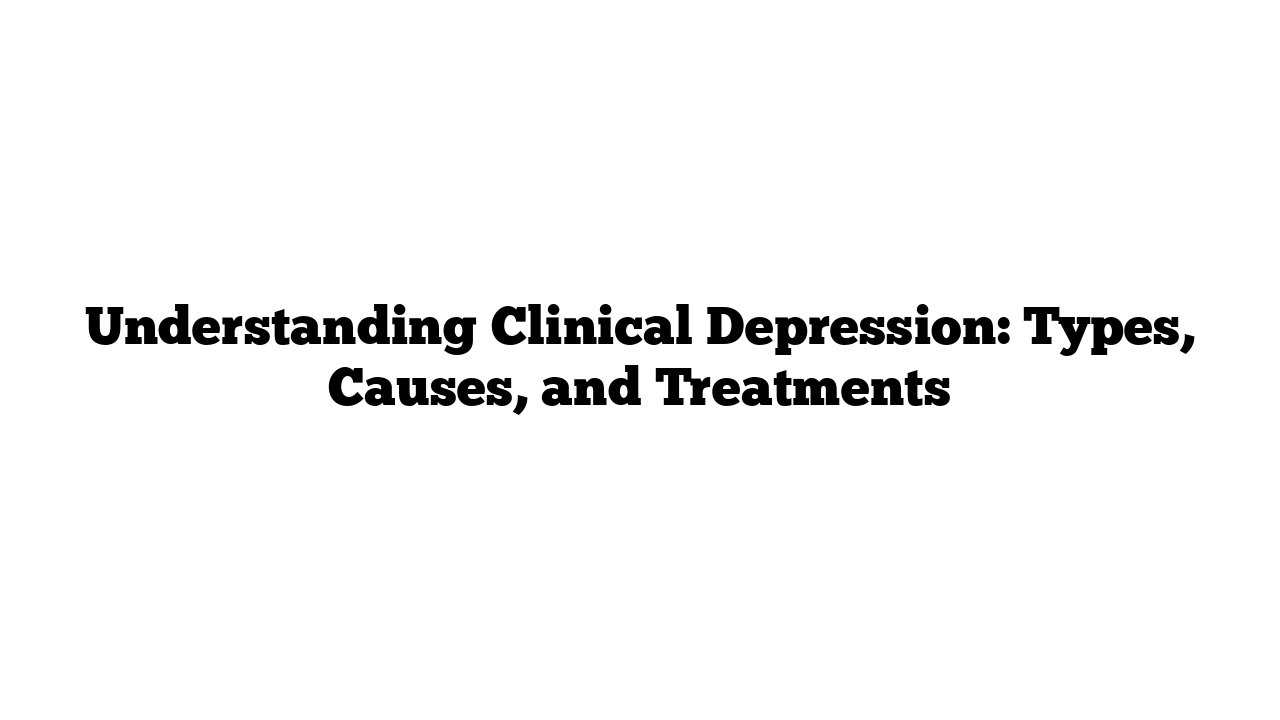What is Clinical Depression?
Clinical depression, often referred to as major depressive disorder (MDD), is a serious mental health condition that can significantly impact daily life. It affects approximately 20% of women and 12% of men at some point in their lives, making it one of the leading reasons people seek mental health services. Unlike temporary feelings of sadness, clinical depression can lead to persistent feelings of hopelessness, anxiety, and discouragement, severely interfering with day-to-day activities such as work, study, and even eating and sleeping.
Types of Clinical Depression
Clinical depression isn’t one-size-fits-all. It comes in various forms, each with unique characteristics. Here are some common types:
1. Major Depressive Disorder
This is the most recognized form, characterized by a persistent depressed mood or loss of interest in activities once enjoyed.
2. Postpartum Depression
Also known as depressive disorder with peripartum onset, this subtype occurs after childbirth and can begin during pregnancy or up to four weeks post-delivery. Hormonal changes, alongside lifestyle adjustments, may contribute to its onset.
3. Atypical Depression
In this type, individuals may experience improved mood in response to positive events, known as mood reactivity. Symptoms often include increased appetite, oversleeping, and heightened sensitivity to rejection.
4. Persistent Depressive Disorder (Dysthymia)
This milder but longer-lasting form of depression persists for at least two years, with symptoms that may include low energy, changes in appetite, and feelings of hopelessness.
What Causes Clinical Depression?
While the exact causes of clinical depression remain elusive, it is believed to be a combination of several factors:
- Genetic Factors: Individuals with a family history of depression are three times more likely to experience it themselves.
- Biological Factors: Neurotransmitters—chemical messengers in the brain—play a significant role in mood regulation. The three main neurotransmitters associated with depression are serotonin, norepinephrine, and dopamine. An imbalance in these chemicals can lead to symptoms of depression.
- Environmental Factors: Life events such as loss, trauma, or abuse can trigger depressive episodes.
“The development of depression is complicated and involves biological, genetic, and environmental factors.”
Recognizing the Symptoms
To be diagnosed with clinical depression, a person must experience at least five of the following nine symptoms most days for nearly two weeks:
- Depressed mood or irritability
- Diminished interest or pleasure in activities
- Significant weight loss or gain
- Insomnia or oversleeping
- Fatigue or loss of energy
- Feelings of worthlessness or excessive guilt
- Difficulty concentrating or making decisions
- Recurrent thoughts of death or suicidal ideation
These symptoms must cause significant distress in daily life and cannot be attributed to another mental disorder or medical condition.
Treatment Options for Clinical Depression
Although treating clinical depression can be challenging, approximately 70-80% of patients find relief through appropriate interventions. Treatment typically falls into two categories: non-pharmacologic and pharmacologic approaches.
Non-Pharmacologic Approaches
- Physical Activity: Studies indicate that regular exercise can alleviate symptoms of depression by releasing endorphins and improving overall mood. Engaging in 20 minutes of exercise, three times a week, can be beneficial.
- Dietary Changes: While no specific food can cure depression, maintaining a healthy diet rich in fruits and vegetables may support mental well-being.
- Psychotherapy: Often referred to as “talk therapy,” psychotherapy can be especially effective for young patients and those with milder symptoms. Popular methods include cognitive behavioral therapy (CBT) and interpersonal therapy.
Pharmacologic Approaches
For individuals with more severe depression, antidepressant medications may be prescribed. The most commonly used are selective serotonin reuptake inhibitors (SSRIs), which increase serotonin levels in the brain. Other classes of medications include monoamine oxidase inhibitors (MAOIs) and tricyclic antidepressants.
Advanced Treatments
In severe cases, electroconvulsive therapy (ECT) may be considered. This involves administering a controlled electric current to the brain while the patient is under general anesthesia, inducing a brief seizure. Although effective for about 50% of patients, the mechanism by which ECT improves symptoms remains unclear.
The Importance of Support
Navigating clinical depression can be challenging, not only for those experiencing it but also for their loved ones. Social support from friends and family is crucial and can significantly improve treatment outcomes.
If you or someone you know is struggling with clinical depression, seeking professional help is a vital step toward recovery.
For more information and support, visit medicaltimes.io.
“Love and support from friends and family help tremendously.”
A Path to Recovery
Clinical depression is a serious but treatable condition. With the right approach, many individuals can manage their symptoms and reclaim their lives. Remember, you are not alone, and help is available.
